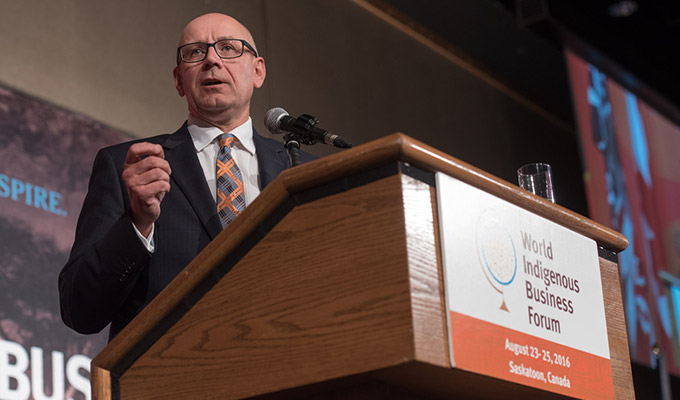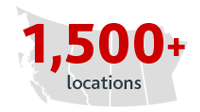
FCL CEO Scott Banda speaks at the World Indigenous Business Forum Aug. 24 in Saskatoon.
Co-operative and indigenous values can change business
August 25, 2016
Scott Banda believes co-operatives and indigenous leaders can lead a conversation about how business in the future measures success and why the creation of value is a broader concept than only an immediate financial return.
“Too many companies for too long have viewed their success or purpose as creating a short-term financial return for the shareholder – pressures that many are calling the tyranny of the quarter,” the Federated Co-operatives Limited (FCL) CEO told the World Indigenous Business Forum in Saskatoon Wednesday.
“This has led some to some very short-term thinking that has an impact on the well-being of consumers, communities, environment and natural resources.”
Banda said that co-operatives not only focus on economic factors, but also on social returns to members and communities, often over the long term. This shared value approach to business is a new way to achieve economic success.
“It’s about enhancing the competitiveness of the company, but it’s also about advancing social and economic conditions in communities where we operate.”
Creating shared value
FCL demonstrates the shared value approach in its agreement with the Prairie Fresh Food Corporation, a group of 17 Saskatchewan producers. Since the agreement began in 2013, the volume of vegetables purchased by Co-op has grown more than 200 per cent, leading growers to expand their operations and adopt new technologies.
Banda also highlighted FCL’s work in the establishment of the Sustainable In-Situ Remediation Co-operative Alliance (SIRCA). SIRCA is a collaboration of co-operatives, academic and industry collaborators researching new technologies to clean up contaminated fuel and fertilizer sites – with innovation to be shared not sold.
Banda noted that there are many parallels between this shared value concept and how indigenous business and communities view the world. And yet, despite these perceived similar values and beliefs, the reality is that few indigenous co-operatives or relationships with co-operatives exist.
This is in conjunction with FCL acknowledging that Co-op has a great deal of work to do in developing mutually beneficial long-term relationships with indigenous communities and businesses. In order to develop these relationships, FCL also recognizes that the best approach is to engage in meaningful conversations with indigenous communities and businesses about opportunities and best approaches to make progress.
Launching Co-operatives First
The first step in that process was a two-year, FCL-funded research project with the University of Saskatchewan and the Plunkett Foundation based in the United Kingdom. The Co-operatives Innovation Project produced a wealth of information that has informed the next phase of this important engagement project. FCL has funded a new organization called Co-operatives First, a non-profit organization designed to inspire co-operative development in rural and indigenous communities.
“Co-operatives First isn’t about developing or growing our own business; it’s about identifying what the co-operative business model can do to help engage and build,” Banda said. “The research told us that there are a lot of challenges . . . . But we also learned there is tremendous interest in the co-operative business model.”
He said there is an enthusiasm to find solutions at the local level. The solution lies in people identifying needs and working together to address community needs, which has always been “the co-operative approach in Western Canada.”
“Visionary values-driven co-operatives can improve communities – whether they’re indigenous, non-indigenous or both – and be the local business of the future,” Banda said. “The co-operative model lends itself to create and deliver shared value that can be responsible and sustainable now and into the future.”





